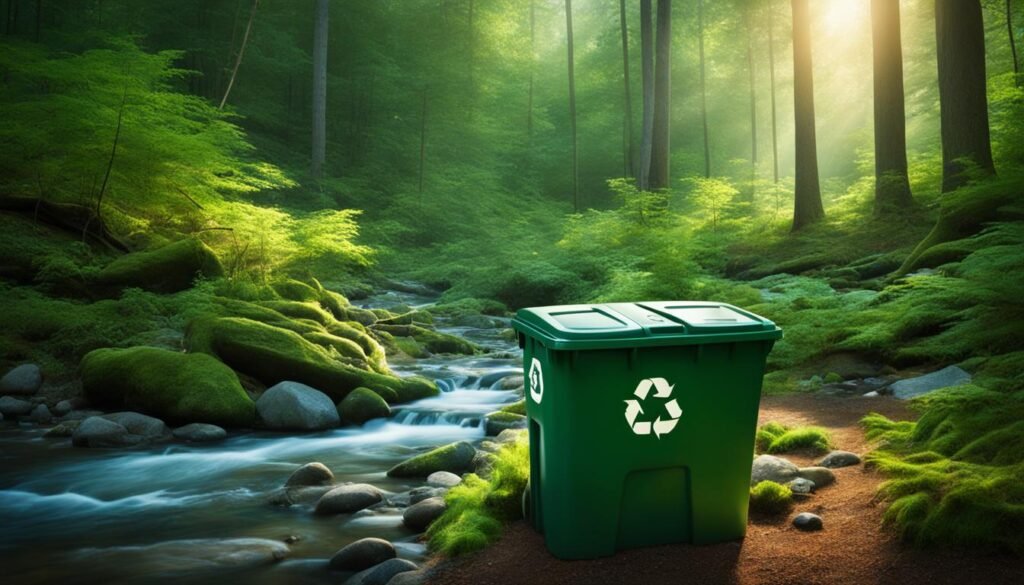Did you know Fort Lauderdale boosted recycling rates with a simple plan? The city introduced a single-stream recycling program known as Mix it. Curb it. This initiative lets people mix all clean recyclables in one bin. No sorting needed.
Since kicking off in 2012, Mix it. Curb it. has simplified recycling for everyone. It’s now easier and more convenient. This change has greatly improved how the city manages waste.
Key Takeaways:
- The Mix it. Curb it. program in Fort Lauderdale allows residents to mix clean recyclable materials in one container without sorting.
- The program offers various advantages, such as larger capacity, protection from the elements, and consistent pickup days.
- Accepted recyclable materials include plastic containers, glass containers, metal cans, paper, and cardboard.
- Residents can request larger carts, repair or replace damaged or stolen carts, and share carts in multi-family buildings.
- The Mix it. Curb it. program aims to make recycling convenient, efficient, and cost-effective for Fort Lauderdale residents.
Recycling Myths and Expert Tips
There are a lot of wrong ideas about recycling out there. Knowing the truth is key to doing it right. Below, we’ll clear up some common myths and share tips to make you a pro at recycling.
Myth: Most Americans recycle all they can
Some think that Americans recycle all they can. Yet, research says convenience and commitment are key. It helps to have recycling bins in more than one room to boost recycling habits.
Myth: The recycling arrows on a container indicate recyclability
The recycling arrows, or Mobius symbol, might suggest a product is recyclable. It actually means the product can be recycled in areas where facilities exist. So, always check your local rules before recycling.
Myth: Haulers will sort everything placed in the recycling cart
Many believe haulers sort all recyclables. But wrong items can spoil the bunch and up costs. Make sure to only recycle clean bottles, cans, paper, and cardboard. Clean these items before recycling, but they don’t need to be spotless.
Myth: All aerosol cans are recyclable
While many areas accept aerosol cans, they must be empty and safe. Always empty cans completely and check they don’t have hazardous materials. Follow your local recycling program’s directions carefully.
Myth: All plastic items are recyclable
Not all plastic things can be recycled. For example, hoses and shower curtains often can’t be. It’s best to throw them away as regular trash. Always check what your local program says about plastic recycling.
Myth: Glass recycling is the same everywhere
Glass recycling rules differ by place. Some areas have drop-off spots or curbside pick-up for glass. Always look up how to recycle glass correctly in your area. Each effort counts in minimizing waste in landfills.
Breaking these myths and applying expert advice can make you a top recycler. Always double-check your local recycling rules and teach others how to recycle right. Together, we can help the planet.
Tips for Effective Waste Management
Recycling is a good start, but there’s more we can do to lessen our environmental impact. Properly disposing of waste helps avoid pollution and meet landfill rules. Things like batteries, paint, and car fluids should go to special places for disposal.
Minimizing food waste is another step. Plan meals well and store food correctly. This ensures you eat all your food before it goes bad. Composting organic waste is also a great move. It lessens waste in landfills and enriches your garden soil.
Try to reduce how much disposable stuff you use. Pick reusable items instead. For instance, use a reusable water bottle instead of a throwaway one. This small step can cut down a lot of plastic waste.
To do even more, look into eco-friendly waste solutions. Solar-powered waste systems use the sun’s energy to manage waste while protecting the environment.
Support local recycling efforts too. See if there are community recycling programs or groups around you. Joining in helps spread the word about good waste management and shows how important it is to dispose of waste right.
In sum, by following these tips, you can reduce your impact on the environment. It starts with us, but it can help the whole planet and future generations too.
Hazardous Household Materials
| Material | Designated Disposal Facility |
|---|---|
| Batteries | Local recycling center or battery drop-off locations |
| Paint | Hazardous waste disposal sites or community paint recycling programs |
| Automotive fluids | Auto parts stores or designated recycling centers |

Effective waste management takes all of us working together. By sticking to these tips, following the rules, and adopting best practices, we’re on the path to a cleaner, greener future.
Conclusion
Waste management is very important for our planet. It’s about keeping our future clean and green. By learning about waste FAQs and recycling rules, you can help.
When you get rid of waste the right way, you’re doing something great. Using eco-friendly methods is key.
Know the rules in your area and join in on local recycling efforts. You can be a big help. Teach others about recycling. This way, we can all do our part.
Waste management takes everyone working together. What you do makes a difference for tomorrow. By using the right bins and following the rules, we make things better.
Let’s all help to keep our planet clean and safe. Follow the guidelines. Let’s strive for a cleaner, healthier earth.
